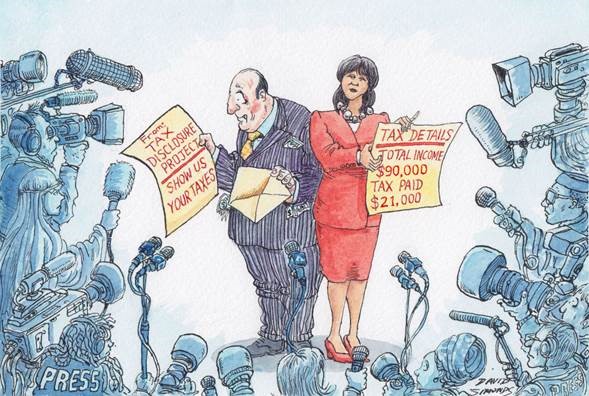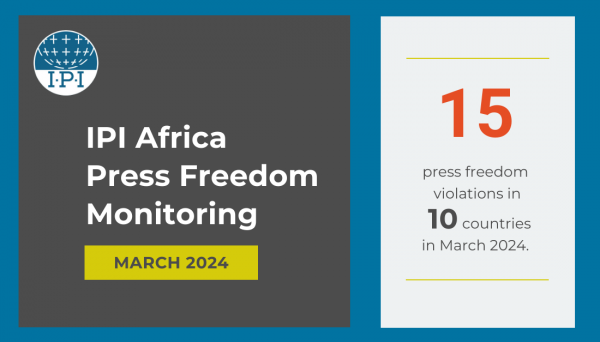Pakistani investigative journalist Umar Cheema and Nick Mathiason, director of Finance Uncovered, a training organisation for journalists covering illicit finance, are the brains behind the Tax Disclosure Project, an innovative and unique global initiative that holds politicians to account by asking them to publicly disclose their taxes.
The origin of this project dates back to 2012, when Cheema, an International Press Institute (IPI) member, began investigating the tax records of Pakistani government officials, finding that around 70 percent of Pakistan’s lawmakers, including the country’s president and 34 ministers, did not file tax returns.
The impact of Cheema’s work was tremendous. In the words of Mathiason:
“Umar single-handedly forced Pakistan’s politicians – and indeed all its citizens – to disclose their tax returns. Pakistan had one of the lowest tax collection rates as a proportion of GDP, so what Umar highlighted was, I thought, incredibly important.”
Cheema changed Pakistan’s governmental status quo. Today, every politician in Pakistan makes his or her tax data public. In fact, every Pakistani citizen’s tax details are published annually in a public directory.
In February 2017, Finance Uncovered, with the help of Cheema, launched the Tax Disclosure Project with the objective of ensuring transparency and accountability among lawmakers worldwide and regaining the public’s trust in those they elect to represent them.
IPI talked to Cheema and Mathiason about the origins of the project in Pakistan, its evolution into a global initiative, the project’s goal, and how IPI and its members can contribute. (Answers were shortened and edited for publication.)
IPI: Umar, you were the inspiration for the international Tax Disclosure Project – the person who came up with the idea to contact all 446 federal legislators in Pakistan asking them to disclose their tax returns. What did you hope to achieve by doing this?
Cheema: It is a humbling moment, to begin with, that a project launched in Pakistan inspired enough attention to make it a global initiative. We want to see in other countries what has been done in Pakistan, where tax information of all the lawmakers is public. People have a right to know about the financial integrity of those who are voted to power. Trust in politicians is on the decrease the world over. They get votes from the poor and guard the interests of the rich – [this] is a widespread perception among ordinary people. Regaining the lost trust is very important and financial transparency is essential for that purpose. There is no better proof to show than making taxes public.
IPI: What impact did your follow-up reports have in Pakistan?
Cheema: The impact is phenomenal. My first report made global headlines. The New York Times, The Guardian, Reuters, National Public Radio, Al-Jazeera, CNN, Reuters, AP and AFP carried it. The report also echoed in the British Parliament. The Federal Tax Ombudsman of Pakistan declared it a damning indictment and demanded fresh oaths from MPs wherein they had to declare they pay their taxes honestly. The follow-up report did something great. A dream came true. The government announced it would release two tax directories each year: one for MPs and another of the citizens who file tax returns. With this, Pakistan has become the fourth country in the world where tax data has been made public.
IPI: How did your project evolve into a global initiative? How did Finance Uncovered become involved?
Cheema: The idea was conceived in 2015 when I gave a presentation (about my tax work in Pakistan) during illicit finance training organised by Finance Uncovered in London. Participants were greatly impressed to know how one journalist’s efforts resulted in a significant impact.
Nick then asked me how it can be replicated at a global level. [While] I was fortunate to have cultivated links in the tax department who shared the tax records of lawmakers on my request, journalists from other countries might not be lucky enough to have such sources. Therefore, I suggested they initiate efforts by writing letters to their MPs. No matter if the politicians reply or not, that will make news and trigger debate on their tax disclosures. Publicity of the findings may also likely attract the attention of the whistle-blowers. This is how the idea was conceived.
IPI: Nick, what prompted you to work with Umar and turn his initiative into a global project?
Mathiason: I co-direct a reporting and training project called Finance Uncovered. We train journalists and campaigners to investigate tax abuse, money laundering and corruption and then we support our trained global network helping them get stories and reports into the public domain.
In 2014, a Reuters journalist who attended our course told me about Umar’s work and recommended that I should get him to come to our training. So, the following year we invited Umar to London. We were honoured he accepted our invitation.
Umar presented his work to participants. We were struck at the impact his work had.
Listening to Umar, I thought that Finance Uncovered’s network – we have trained 209 reporters from 70 countries – had the potential to walk the same path as Umar. We could try to make what Umar started a global project. So, two years later, we got Umar back to London and launched the Tax Disclosure Project.
We had already planned to organise a workshop for some of our alumni. The workshop focused on kleptocracy and politicians’ assets. It seemed to us that the Tax Disclosure Project (TDP) should and could be part of this workshop. So in London, after we selected our participants, we worked with them to get the email addresses and twitter handles of national legislators in our participants’ countries. We created a website through which we launched the project working with coders in South Africa.
In late February, we went live making requests to close to 7,000 politicians in 20 countries.
IPI: Through the Tax Disclosure Project, journalists from around the world are requesting politicians to publicly disclose their taxes. At what stage are you now? Have there been any major breakthroughs in any of the countries you are focusing on?
Mathiason: We uploaded 7,539 names of politicians to the website and sent initial requests – email and by post – to 6,625 politicians. According to our records, we have received responses (defined as general positive/negative responses and full disclosures) from 108 politicians. We have full disclosures from 54 politicians.
The best country by far has been Chile, with 40 full disclosures (26 percent of national politicians). This is because the journalist Juan Andrés Guzmán from Chile’s respected investigative news siteCiper put a lot of effort in chasing these requests. We have also received a lot of interest in Hungary where the opposition Labour party is considering tabling legislation demanding MPs there disclose their tax returns. Five MPs there have disclosed their tax returns.
Our participant in Sierra Leone is very keen to go big on the TDP and has received interest from a donor, which may give his publication the capacity to really push on with politicians’ tax disclosures there.
IPI: What is the ultimate goal of the Tax Disclosure Project? Do you expect to see legislative change in the respective countries? Do you hope for broad public participation in the project?
Mathiason: We want our Tax Disclosure Project to have a similar impact to what Umar achieved in Pakistan. There is, in our view, a clear and substantial public interest in elected representatives fully disclosing their sources of income and their tax payments. Elected representatives are paid by taxpayers to make decisions on taxation and on how our money is spent on behalf of all of us.
The aim is to ensure transparency, accountability and an avoidance of wrongdoing and potential conflicts of interest. Today, there are only a handful of countries such as Finland, Norway, Pakistan and Sweden where elected representatives publicly disclose their taxes. We want to see more countries where politicians disclose their full income and the taxes they pay.
IPI: What can IPI and our members do to help? Is there anything your project would need in taking next steps?
Mathiason: We would be very keen to work with media organisations from countries other than the 20 who have started the TDP. So, if editors in countries such as the United States, Germany, France, Spain and Japan are interested in this project do get in touch.
Finance Uncovered is currently staffed with just three full-timers. From my perspective, what would help the Tax Disclosure Project really fly is increased capacity to marshal and encourage our network of journalists to put more energy into the campaign. This obviously requires funding!
But once a mass disclosure request is made in a specific country, if journalists really engage with this process – if they find sympathetic legislators who can champion the cause as well as contact others and really create a stir; then they can get results. And that would be quite a story and some achievement.



